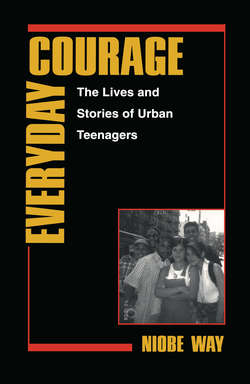Читать книгу Everyday Courage - Niobe Way - Страница 20
На сайте Литреса книга снята с продажи.
Questions about Power
ОглавлениеThis relational, voice-centered research approach compelled me to raise questions about what it means to be a white, middle-class female researcher studying poor and working-class adolescents who are primarily of color. Was I perpetuating a historical inequity that places the white researcher in charge of conveying the words of those with less power? Gilligan raises similar questions: “Who is observing whom and from what vantage point? Who is speaking about whom and in whose terms?”43
In relationship with the adolescents I interviewed, I find myself in a different position from researchers who come into their respective environments intending to stand outside of the research relationship in the name of objectivity, to study their “subjects,” and to depart with “truths” to disseminate to their colleagues, the interested public, and eventually the policymakers who shape their subjects’ lives. I understand the process of the interview to be a process of jointly constructed meaning. I listened to the adolescents knowing that I listen to how they respond to my questions and to my interests concerning their experiences of their worlds. I am not objective and the adolescents do not respond objectively or neutrally about their experiences. Each of my questions and each of their responses was filled with our own assumptions, expectations, and desires. Although I had the power to choose the questions and to interpret their responses, the adolescents in turn had the power of knowing their own experiences and deciding what to tell me and what not to tell me or the other interviewers. Even if we are socially constructed beings largely shaped by the cultures in which we exist, we are engaged in a relationship in which each of us has power over what we say and how we say it.44
I do, however, have power in these research relationships: power to decide what to include in my analysis and what to exclude; power to take the words of the adolescents and create meanings to which they cannot respond because I did not ask for their responses. But I assume this power with great care and trepidation, realizing throughout my analysis that I can misunderstand or misrepresent what they are saying. This knowledge makes me especially careful to “stick close” to the interview texts.45 I quote from their interview transcripts, often at length, so that their voices can be heard throughout my interpretation. A common criticism of qualitative research has been that researchers paraphrase the narratives too much and, consequently, do not provide enough textual evidence for the themes being discussed. Broad strokes are made about human experience, and little detail is provided concerning the narrative(s) that provoked these assertions. I was mindful of such criticism as I analyzed and presented my findings. I paid particular attention to ensuring that my reader could see the narrative to which I was responding. I made interpretations only after I had reread each section of each interview repeatedly and believed that I could provide evidence in the interviews of a particular interpretation. I was wary of my own leaps of inference that take me away from the adolescents’ actual stories and into the tunnel of my own expectations. As I interpreted their interviews, I was continuously engaged in self-reflection: How have I found this theme? Where does this theme come from?
The critical question of what it means to study a population different from my own racial/ethnic and social class background becomes less problematic when I acknowledge that my research is about relationships—relationships between me, as reader, interviewer, and a former counselor in the school, and the adolescents in the study. My power is limited by these relationships. This research project is about what the adolescents were willing to tell me and the team of interviewers (who will be introduced in the next chapter) in response to our questions. My analysis is not about what the adolescents said, but what they said to us.
